When I first decided to play Baldur’s Gate 3 earlier this year, it was for a number of reasons. It had been a while since I played a solid video game. I was coming out of a mental health spiral and felt like I had some energy to put into fun again. But mostly, it was because Bill was so into it. We hadn’t hung out for a while, and it seemed like a good way to connect with an old friend. So I figured I’d give it a try, and see what the fuss was about.
And I was freaking blown away.
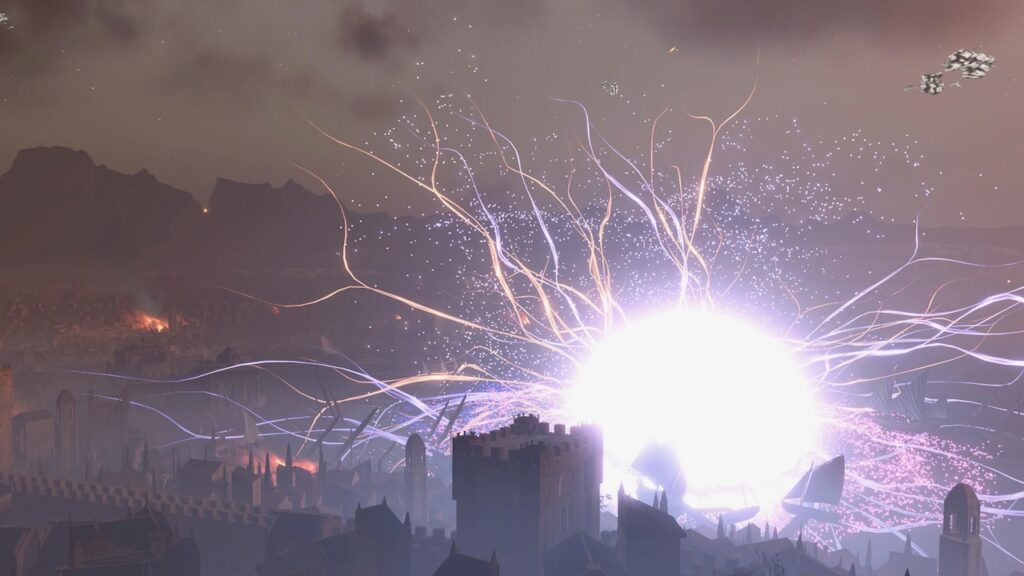
It’s been a long time since I’ve gotten sucked into a video game world this much. The last one was probably the Mass Effect series, and I’ve been riding that high for the past ten years. I’m sure that my friends and family are sick of me talking about this game by now (my brother has started using the phrase “all right, all right, let me go!” when I keep yammering on) but tough titties, that’s the cost of being my friend.
After having read several of Bill’s blog posts on these, I decided that I’d get back into the writing saddle and write a blog post as well, in similar tongue-in-cheek style and with lots of pictures. First problem, I am trying to avoid definite spoilers and keep it generic, so this will be fairly accessible to anyone, even those that are still playing BG3. Second problem, I don’t actually have a blog. This second problem was swiftly solved by Bill offering to host it on his.
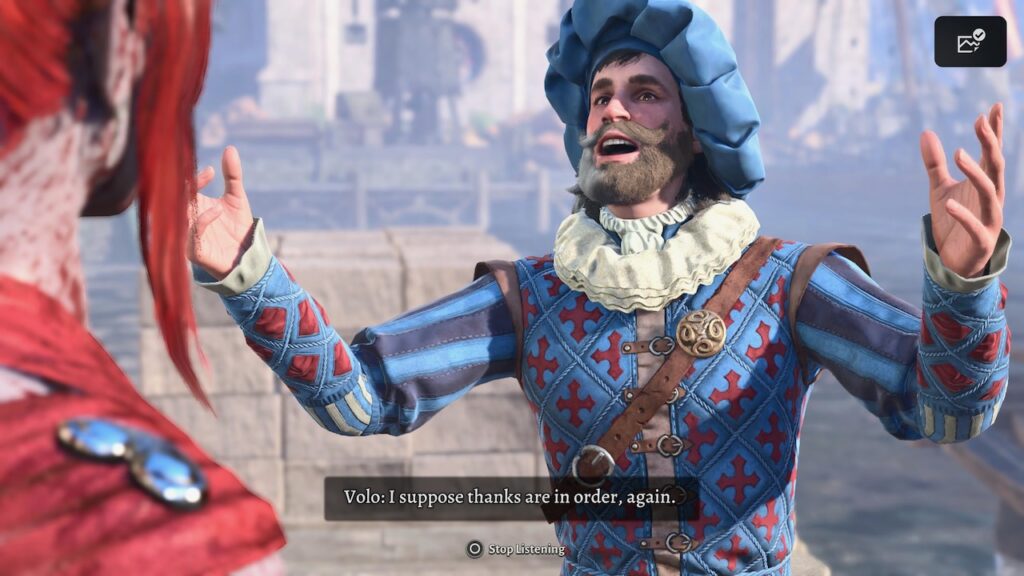
I won’t be doing a summary of the choices we made because I’m trying to avoid full spoilers, so this is more of my reaction and overall review of the game after the first playthrough.
Setup and spoilers
I’m the kind of person that will go into a Broadway show blind without listening to the soundtrack because I want the full emotional experience, and I was mainly playing for the story, so I did not want any end-game information. I knew that Bill had played the game 13 times before (hence this being playthrough 1/14 for me/Bill) and probably had a fount of information to share. I asked for his guidance to help me around the game and make sure I didn’t miss things, but did not want to know spoilers. I had only One Caveat: nothing was to happen to the camp pets.
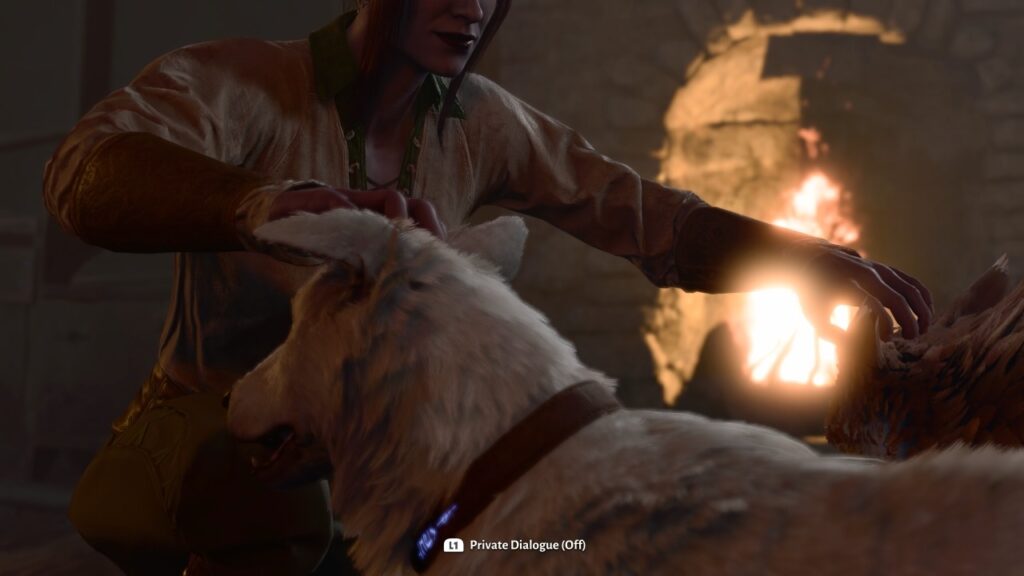

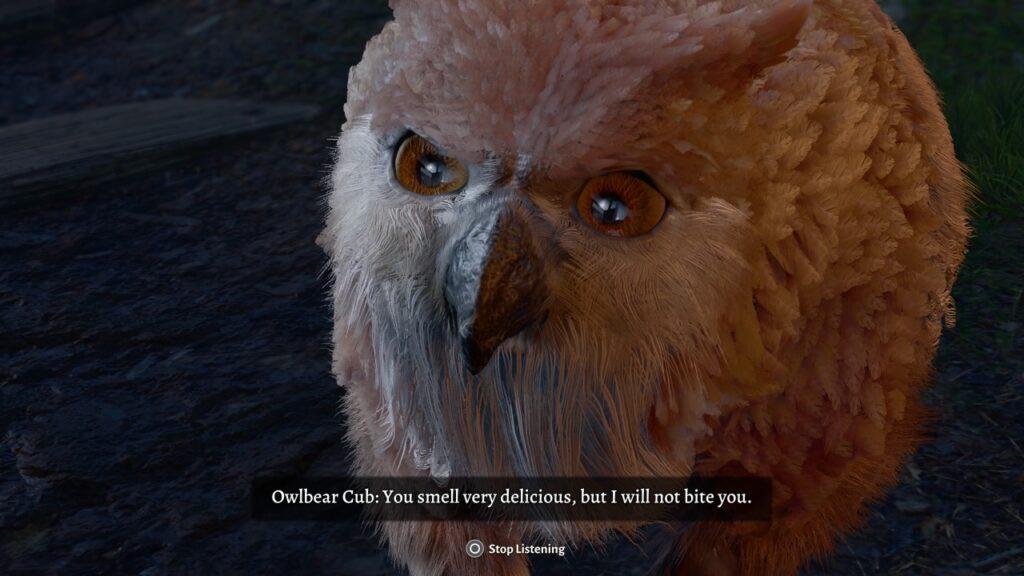
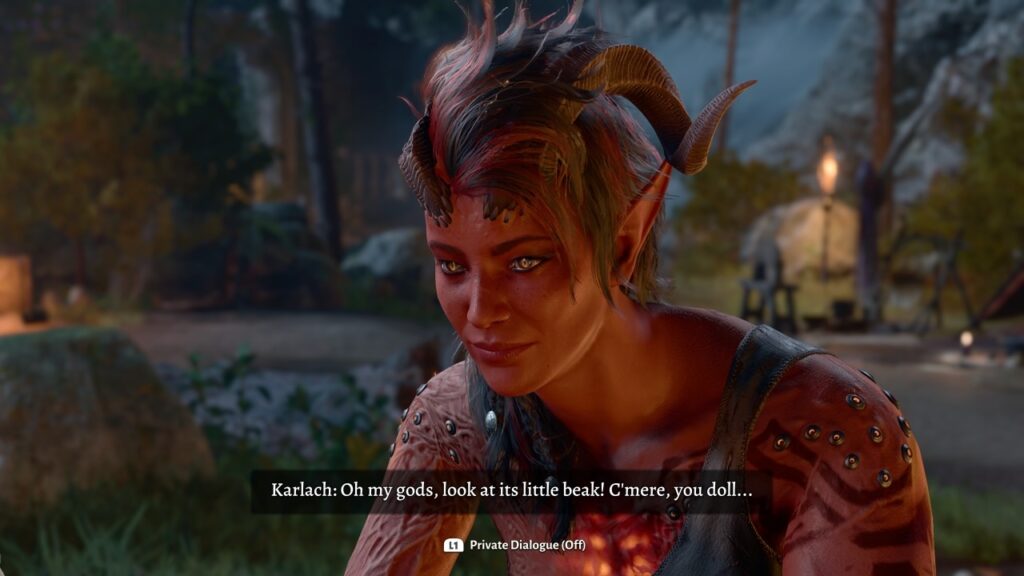
I usually like have my first playthrough role-played the closest to my own self as possible. To that end, I played Fey, a half-drow barbarian that raged a lot, made impulsive decisions based on her code of integrity, gave no second chances, and spoke with animals — you know, life goals.
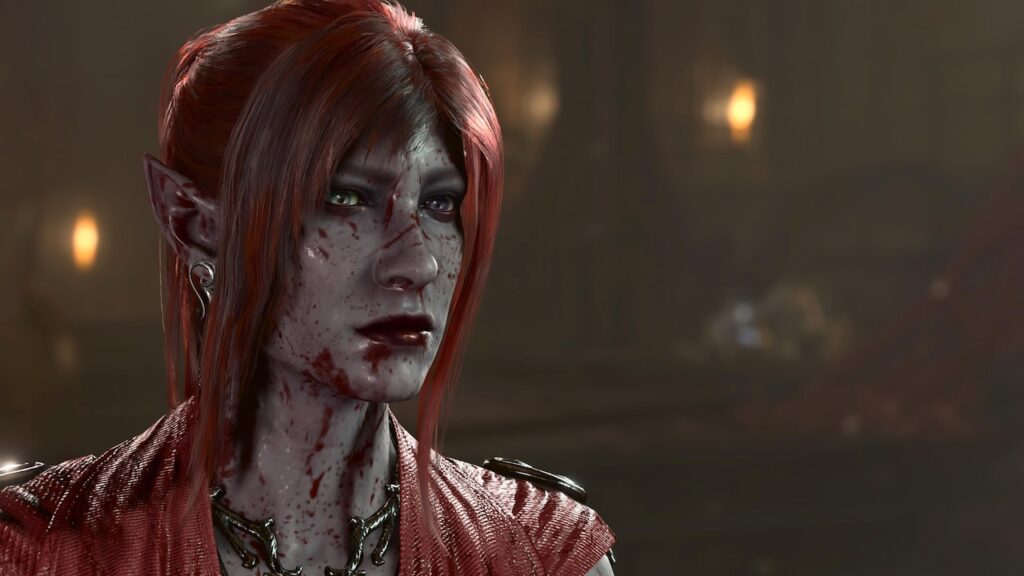
Bill decided to play as Bellandria, a rogue with flexible boundaries in both morals and wallet. Bill tends to play female characters (if you’re going to be spending over 150 hours staring at your character, she may as well be cute) and chose a rogue to try to balance out my inevitable “punch it in the face” style. He likes playing a sneaky rogue anyway, which I guess is also life goals when you live with two cats that are masters at hide and seek.

Playtime
After our final session, I saw that we had clocked about 170 hours into the game. It IS a very long game, and we are both completionists, so it’s not that unusual. The game is split into three Acts. Act 3 is about the length of 1 and 2 combined. I do think that our total runtime was padded by a couple of things. One, I read and loot everything. Every scroll or book or note, I would sit and read. I wanted the world-building, and I had a fear that I’d miss the answer to a quest if I skipped reading.
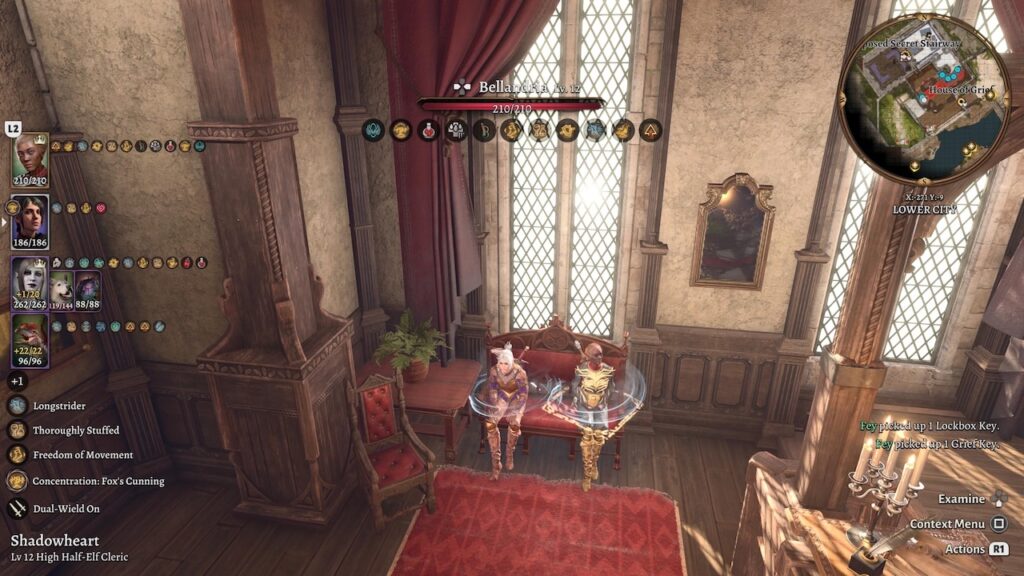
Two, we had technical issues a fair amount. It’s the nature of the beast — being able to multiplayer with a friend far away is awesome enough that I just accept it — but we had recurring issues of Bill not being able to log into my game, graphic glitches, system incompatibilities, etc. We also found that my one mod I had downloaded (the one that gave Scratch more HP — see above One Caveat) could not be active for most of the game. So I’m assuming that subsequent playthroughs will probably be more like 120 hours without both those things.
Replay Value
I’m sorry, did you say subsequent playthroughs? Why, yes I did! In fact, I will probably be most of the way through my second playthrough by the time this posts. I think made it about 48 hours after finishing the game before I started thinking about my next character and playthrough and what I’d want to do. I’m not sure I’m going to match Bill with his double digit playthroughs, but I can see why he’s gotten there!
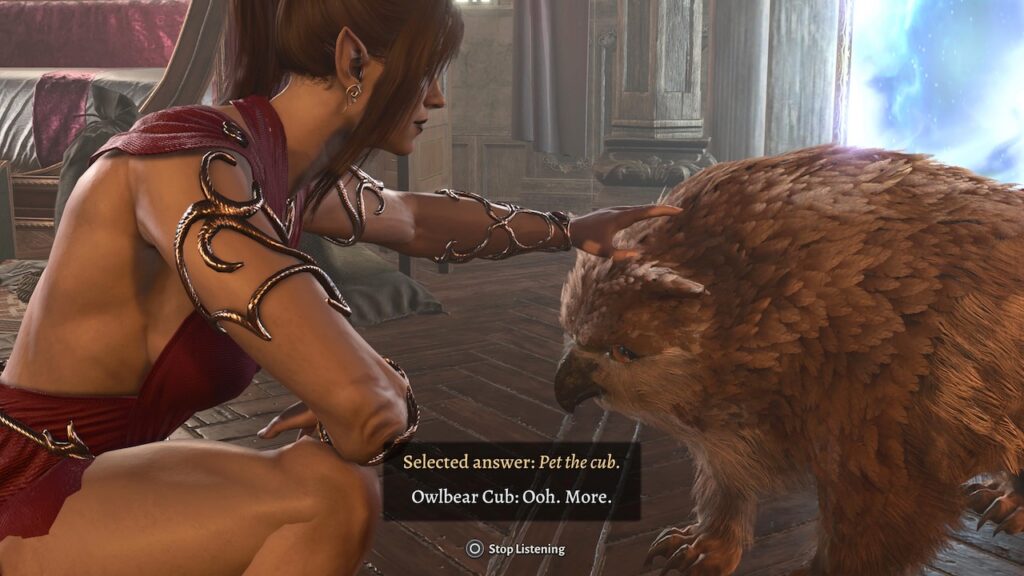
So do your choices actually matter?
Off the bat, this is my most important question for an epic RPG like this. If my choices don’t matter, what’s the point of me playing this game? Short answer, yes, they do. The game is pretty cool with sticking with your choices. You don’t have to pick up certain Companions. You can choose to play an absolute jerk that murders everyone they come across, as long as you are okay with being pursued and throwing down with guards on sight. Choices you make in Act 1 can have repercussions in Act 3, and then a character that could have done you the favor is no longer alive to do so.
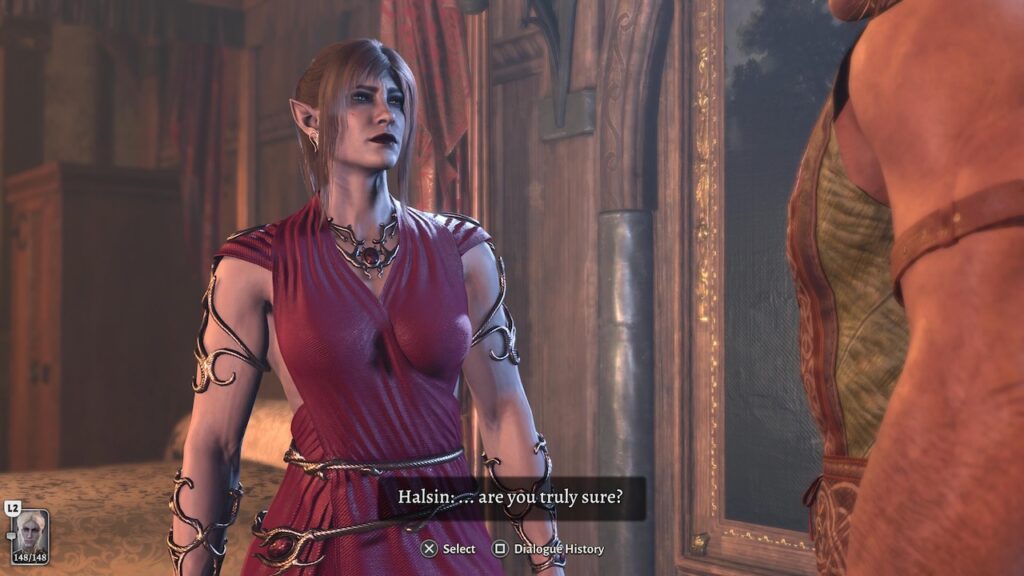
However, there are some things that will happen despite your choices, so it isn’t completely up to you. In fact, I struggled over one of the biggest decisions in Act 1 in playthrough 1/14, and I intentionally made the opposite decision in playthrough 2/14.5. To my surprise, it still led to the same things happening, even the Companion’s reaction to it. That was a little disappointing for a game that has made you live with the consequences of your choices so far. For the record, Bill points out that I am not done with the game yet and there could be repercussions that I haven’t seen yet.
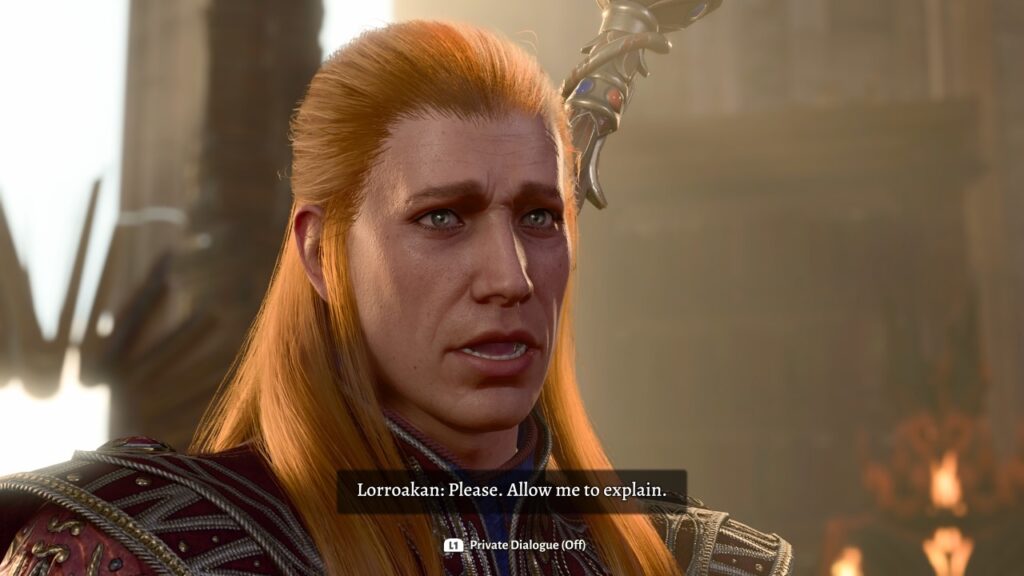
Playthrough 1/14 was on “explorer mode”, aka the easiest difficulty. As with many RPGs, if your choices lead to an outcome that you don’t like, you do have the option to “save scum”, meaning reload from your last save to give yourself the opportunity to make a different choice. I don’t typically like to save scum, since I feel that I, like my characters, should feel the consequences of my actions.
One of the exceptions to this was when we first met Scratch. There is a choice of options on how to react to Scratch defending his master’s body, and it was the first time that either Bill or I saw the “barbarian” reaction to roar. Since neither of us had never seen it before, I clicked it to see what would happen. This was also the first time in 14 playthroughs that Bill had seen a prompted class reaction be the negative one to take, and prompted him to write this in his own post:
“Hodor, however, has never forgiven her”
Slander and lies. Hodor is the bestest boi. He would always forgive me… so long as I bring him a new squeaky toy.
World Building
This is one part where BG3 takes the cake. Takes the cake, eats it, and still has it afterwards. I will discuss at length about the Companion characters and how interesting they are, but the world is chock full of plenty of other characters as well, from one-off interactions that stayed with me…
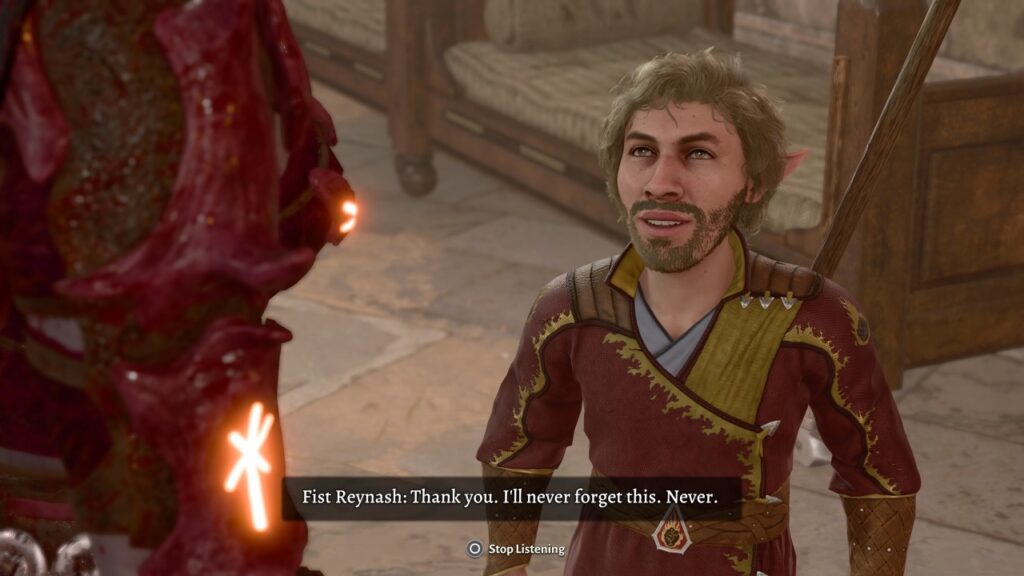
To wonderful animals that you can talk to…
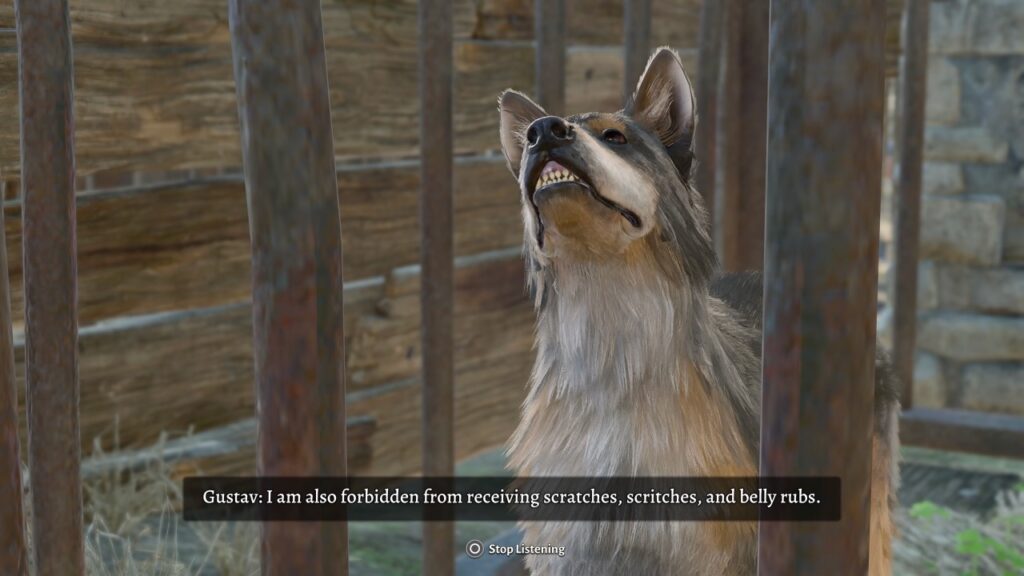
To recurring characters that kept believing in me throughout each Act of the game.
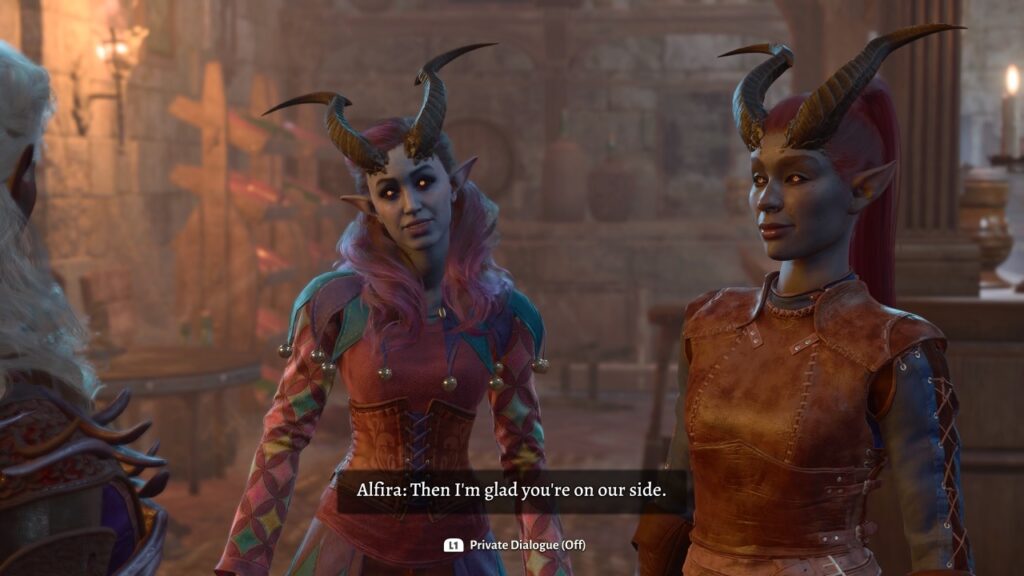
The world-building is phenomenal in this game. The world has actual physics — if you try to run across ice, you may fail a reflex save, slip and fall, and waste the rest of your turn (although luckily, you don’t break any bones). If you cast an lightning spell after your teammate casts a water/ice spell, the water becomes electrified to anyone standing in it. Sometimes the realism is annoying (how dare some nosy busybodies take issue with me looting the corpses that I created in the streets!), and sometimes it makes sense — if I firebomb the drawbridge into the castle, I’ve screwed myself and can’t get in (that way, at least).
Your choices absolutely matter in terms of how you interact with people. If you insult the shopkeepers about their small business, they mark up the prices of what they sell, since you’re a jerk. If you don’t console the drunk with poor self-esteem, he won’t step up into danger to try to save other people in a future scene. Companion characters will leave if you keep ignoring their calls for help. Real consequences for real actions is part of what creates the immersion that I love in these sorts of videogames.
The one criticism I have is that the in-world conversations don’t seem to change. When you walk down the street, the NPCs complaining about Lord Fancypants will continue to complain about him, and the ones talking about their brother’s death just keep reliving it over and over.
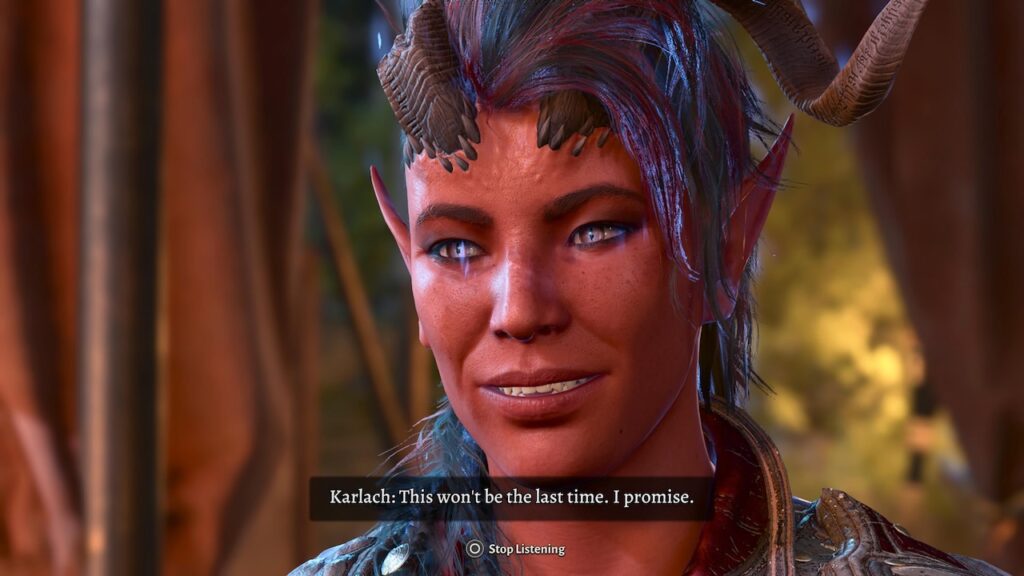
In comparison, in Mass Effect (sorry not sorry), each subsequent time you go down the street, you’d hear the next part of the conversation. I remember one scene, easily missed in a corner of the hospital floor, where a psychiatrist asks her patient about her symptoms (because who needs HIPAA in the futuristic sci-fi world) and what caused her trauma. Each time you walked past that corner, you got the next piece of the story. This happened six or seven times, with each new reveal making me more and more invested in these two throwaway characters that most people probably didn’t even notice. Then the information I had overheard in this part of the story ties in to a different overheard conversation in a way that still blows my mind to this day.
I get that this is actually really difficult to do. Baldur’s Gate 3 is huge with multiple overlapping conversations (there are a few areas of the city I don’t like to stand around in while I mess with my inventory, just because there are so many voices talking about so many things that it overloads my brain). It’s probably not possible to have these have updating conversations, and we do also see small things updated in occasional newspaper headlines. So if it sounds like I’m being nitpicky, it’s because everything else is good enough that I am left with nitpicking.
Speaking of nitpicking: the music
The game has been lauded for its music, which is certainly very pretty. It makes for great ambient noise, and seems to predominate with lovely soft music. Maybe I had been oversold on it, but I found that the music, while perfectly serviceable, wasn’t anything to write home about. There were a couple of themes that get repeated in different ways through the game, but it seemed much less epic than certain other games. I would (and am) going to a live orchestral concert for the Witcher 3 soundtrack, but would not do so for a BG3 one.
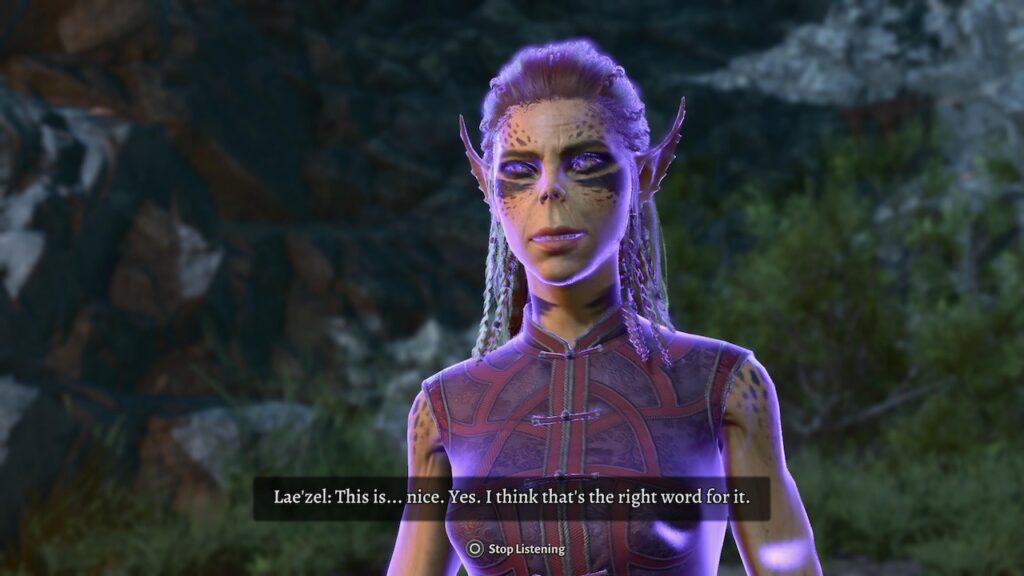
Multiplayer Style
This is the first game I’ve played that had this kind of multiplayer option throughout a story. Mass Effect 3 had a multiplayer aspect, but it was a separate part of the game. I’ve played FPS games and MMORPGs that had this mechanic, but those are never really known for story. This multiplayer was like having someone sitting on the couch with you playing the same game! There were definitely some stylistic differences. Bill likes to explain things a lot, and I have a…challenged attention span. It was a common occurrence for him to say “now, before you give in to your urge to loot whatever isn’t—” and I’d already be “LEEEEROY JENKIIIIINS” into a series of traps.
The man. The myth. The legend.
As we continued playing, Bill learned that he had to just blurt “Stop! Trap City!”
I also tend to operate on the “just smash everything” battle strategy, while Bill tends to prefer sneaking and traps. I personally think that I could be punching people in the face by the time he is done setting up traps. Since it was my game, Bill deferred to my strategy most of the time, but in my second playthrough, I will try to sneak more.
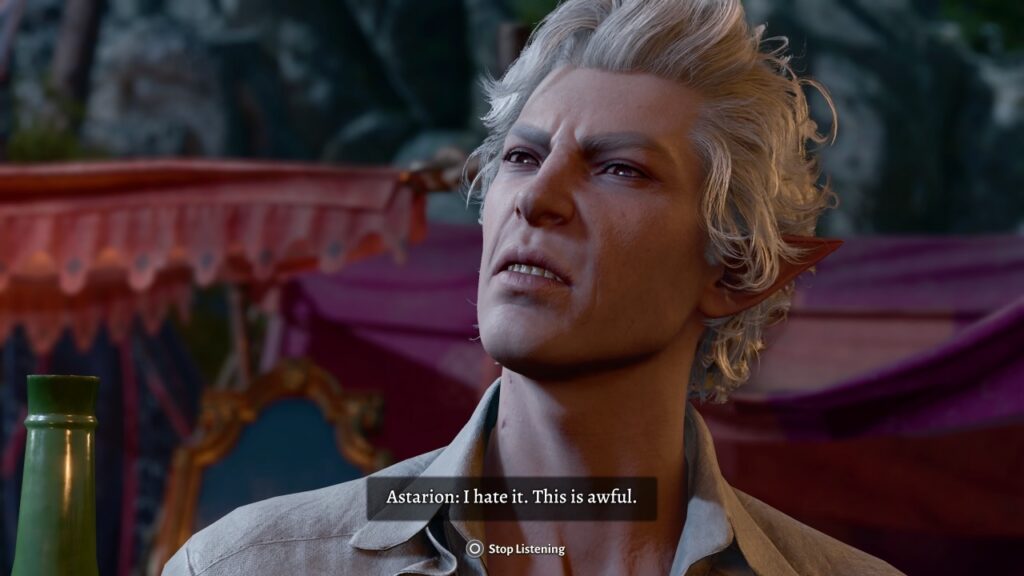
For further context, this is my usual strategy:

Since this was Bill’s 14th playthrough, he acted as a guide, to the point that I started calling Bellandria my GPS. But whereas a GPS only goes where you tell it to, Bill took a more active role, showing me different areas and scenes, sometimes the next part of a quest, and sometimes to something completely new I hadn’t stumbled upon yet. I’m pretty sure Bill guided me to every available quest in the game. This does mean that I didn’t get to just wander and explore the way I normally would have, but the world of BG3 is so big that I have found things (both in playthrough 1/14 and 2/14.5) that Bill had not seen. Which does me feel like a bit of a badass.
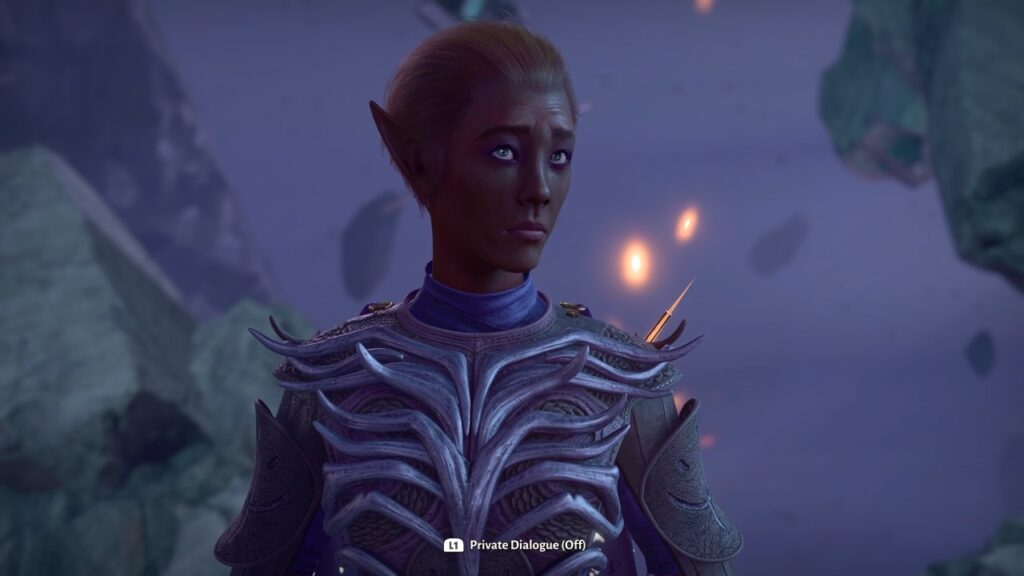
While there is a part of me that missed out on being able to discover new things on my own, it was balanced out by the experience of real-time being able to talk through what was happening, and what we were experiencing. I LOVE hypotheticals, much to the chagrin of many of my friends, but see above tough titties. It’s fun for me to discuss them because I get to see how the other person’s thought process forms, what they take into account, what’s important to them, etc. That’s a core part of playing an RPG, even without multiplayer aspect. I’m convincing a few of my other friends to play it, and even without watching it real-time with them, I’m still going to be very curious as to what choices they make.
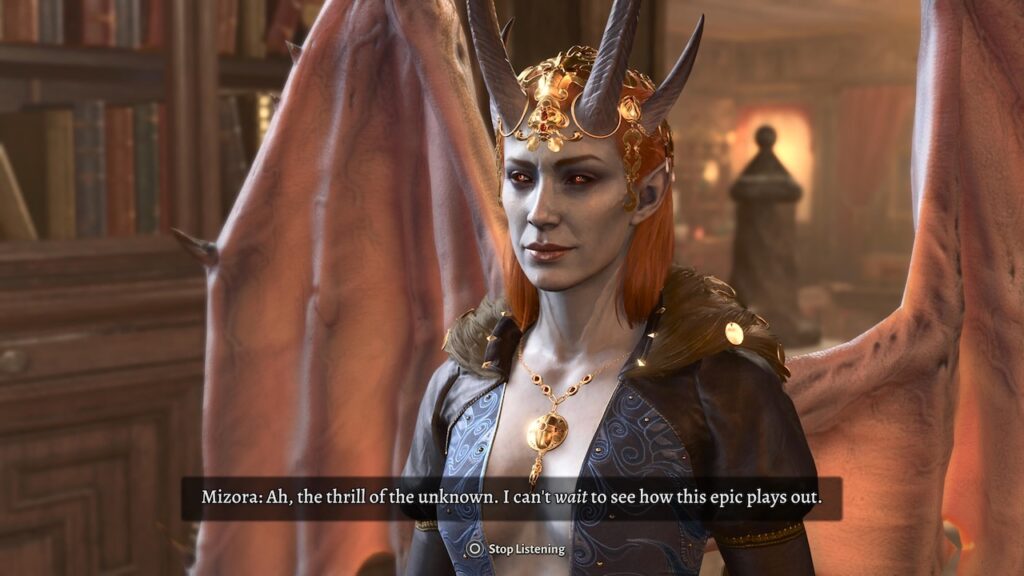
Biggest Multiplayer Downside
One of the major difficulties is that only one person can be the “host” of the game, meaning that this person is the face of the party, makes the big decisions, and interacts with NPCs. For instance, if I as the host decide to, say, smash in the heads of the goblins instead of working with them to backstab the other team, then I would gain “approval” from other characters that are Team Other Side, and gain “disapproval” from characters that are Team Goblin. Approval rating is necessary to initiate romances, but also to sway the character to your point of view, convince them not to stab the man in full plate armor, eat a tadpole, do a public performance with a clown, etc. Since I was the one making most of the decisions since it was my playthrough, Bill didn’t actually get much approval from other characters.
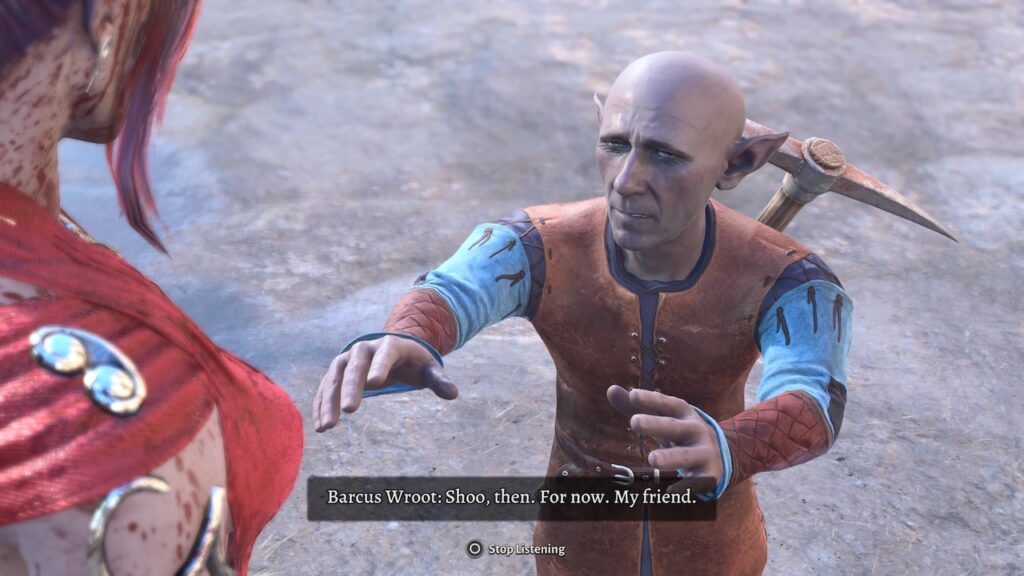
This downside means that no matter how many people are in this boy band, there’s really only one lead singer, so it isn’t truly a balanced multiplayer game. We split our team into two groups of two, one led by me and one led by Bill. However, in terms of making story decisions, it still only tends to be one person. Since you can’t talk to the companion characters that aren’t in your group (they are somehow always “busy”, even when they are just sitting there in camp staring at a rock), this leads to either needing to constantly reshuffle the groups, or giving up on interacting with certain companions.
Bill did eventually find his romance option (for long-time readers of the blog, you get three guesses who, and the first two don’t count) and had her in his group pretty much the entire time. Due to this, I did not interact with her much, and did not gain much approval from her. Given that she was already ‘spoken for’, that didn’t matter, but when I ‘listened in’ on their conversations, she is snarky and absolutely hilarious, and it would have been fun to have her more in my group to interact with.
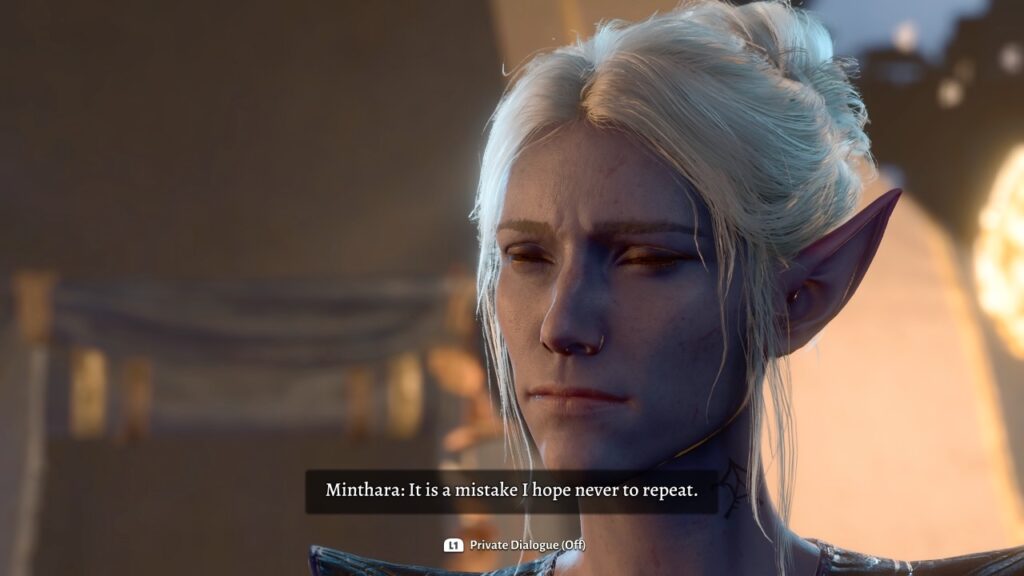
She was not Bill’s initial romance choice, but because I was interacting with Shadowheart more, she didn’t really give him that time of day. There was the option of splitting the cutscenes evenly, but since this was my very first game, I wanted to experience as much as I could. Therefore, Bill got locked out of his Shadowheart romance.
To me, this is an ingrained flaw in this multiplayer, because if you were to split the scenes 50/50 for each player (or 25% for a four-player game), I am not sure you’d be able to gain the amount of approval needed to sway them along certain paths (see later parts), and half of the cutscenes would only be experienced second hand.
The thing that makes a video game different from a book or a movie or a zoetrope is the immersion of having to make an intentional choice. While books and movies (and maybe zoetropes, who knows) can suck me in with the quality of the writing, they are already predetermined. Nothing I say or choose will change anything. But videogames can. Do I choose option A and protect dozens of innocents, or option B and support my teammate who had my back previously? There was many a time that I sat and agonized out loud about a decision while Bill wandered off and fed the cats. Other players do have the option to listen/watch a conversation, and even vote on a choice, but it isn’t the same thing.
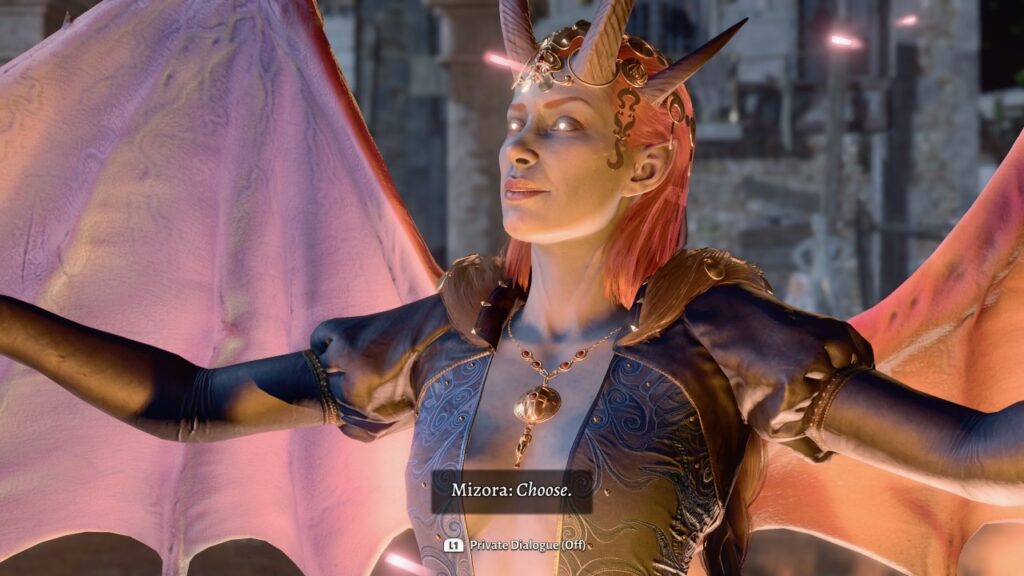
Unfortunately, I can’t really see a way out of this, unless someone develops a mod that lets all player characters gain the companion approval based on the choice that is made. Perhaps one that can even scale based the choice that each person voted on, so it feels more immersive for each choice. Actually, that seems a decent idea. Can a geeky programmer get on this please?!
Speaking of mods:
Mods
For the most part, we made an intentional decision to avoid mods for this first playthrough, because we wanted me to experience the game it was meant to be played. In my second playthrough, I am trying out several. Some are quality of life ones that don’t impact gameplay (certain cantrips lasting until next rest instead of having to be re-cast each time), some are aesthetic (dyeing your camp clothes different colors), and some have a bigger impact. I might go into this in a subsequent blog post.
The only one we attempted in playthrough 1/14 was the Scratch mod. Scratch in-game is very squishy (single digit HP for many levels) and even though he is a familiar, meaning even if he dies, he can be summoned again after a short rest, I did not like the concept of him dying even temporarily. This meant that I frequently kept him at the back of the party being shielded like one of those escort mission objectives that I hate in other games, and didn’t send him forward to attack enemies because of possible counterattacks. The mod I wanted to use would give him extra HP, as well as keep his programming from running into acid or fire or such rude things. Unfortunately, this mod was not compatible to playing with Bill, so we had to disable it. Which means that, in essence, I was choosing Bill over a doggy. Which is not a choice I typically (or ever?) make in real life.
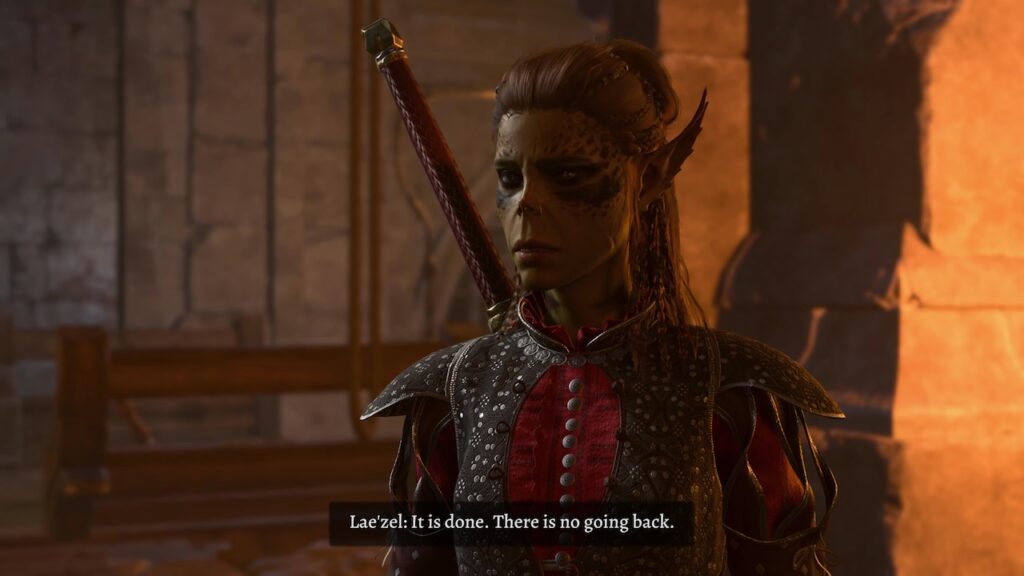
Companions
This is where the game truly shines. You start the game with your own character (a “Tav”) and then pick up several companions along the way (or not — the game is actually really accepting of you going “nah, not going to pull this random arm sticking out of a rock”). Most RPGs live and die on their companions, but BG3 has some of the best-developed ones that I’ve seen. Each one has a fully-fleshed out background and character arc that you can influence, a nuanced personality, and jeez, enough emotional baggage to ground a cargo plane.
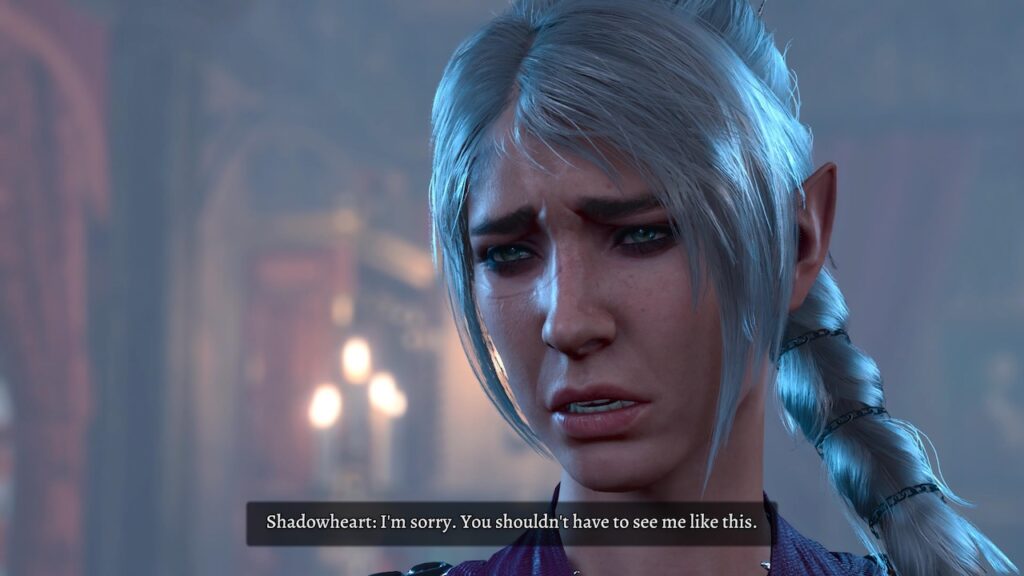
Each of these Companion characters starts off pretty toxic in some way or another — self-absorbed, secretive, demanding, crass, etc. Some I really grooved with, and some I didn’t. I actually had one character for whom there was so much reciprocal disdain that they permanently left the party and told me that they hoped I would “die screaming” (the feeling was mutual, buddy). This character is beloved by many, many, MANY players. They are what could charitably be described as the internet waifu. I went into it cognizant of this, yet even after they left the party, I still stand by my decision and wouldn’t have changed it.
That’s how interesting this game can get in terms of character development. It may be that this character just isn’t to my taste, but it may also be that I didn’t interact with this person enough for them to open up to me. In fact, in my second playthrough, I intentionally sought to romance this character just to get exposed to them more and see if that raised my opinion of them. Given that the bar was low enough that Mizora trips over it, it shouldn’t be hard.
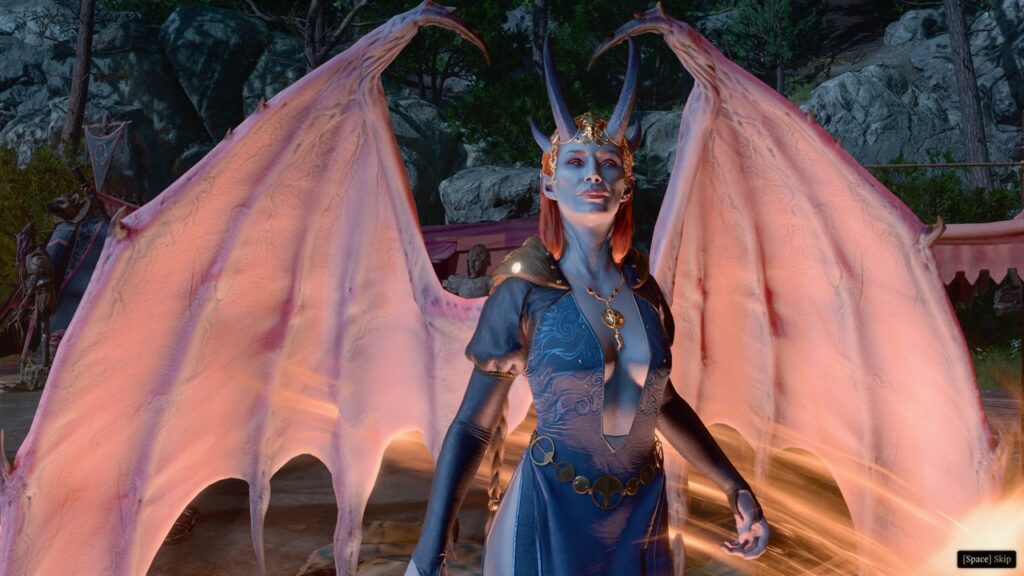
As I have started my second playthrough, I am beginning to see how much interacting with the companion changes them as a person. The aforementioned ‘die screaming’ character didn’t travel with us very often in playthrough 1/14 because Bill’s character could do similar things, and because I didn’t much like this person’s personality. But as a result of this, they never got to grow as a person, learn how to interact with people in a healthy way, or experience emotions that change them as a human being. They ended the game exactly as negative and self-absorbed as they started. While it is not my job to “fix” people, we all affect each other in many ways, even in real life. Having this character along in my second playthrough gives me a difference in perspective on why they are how they are, and conversely, is giving this person a change in perspective on how they see people (victims to be used vs actual not-victims-so-what-are-you-but-this-is-nice). It’s realistic for how relationships, platonic or romantic, can change a person.
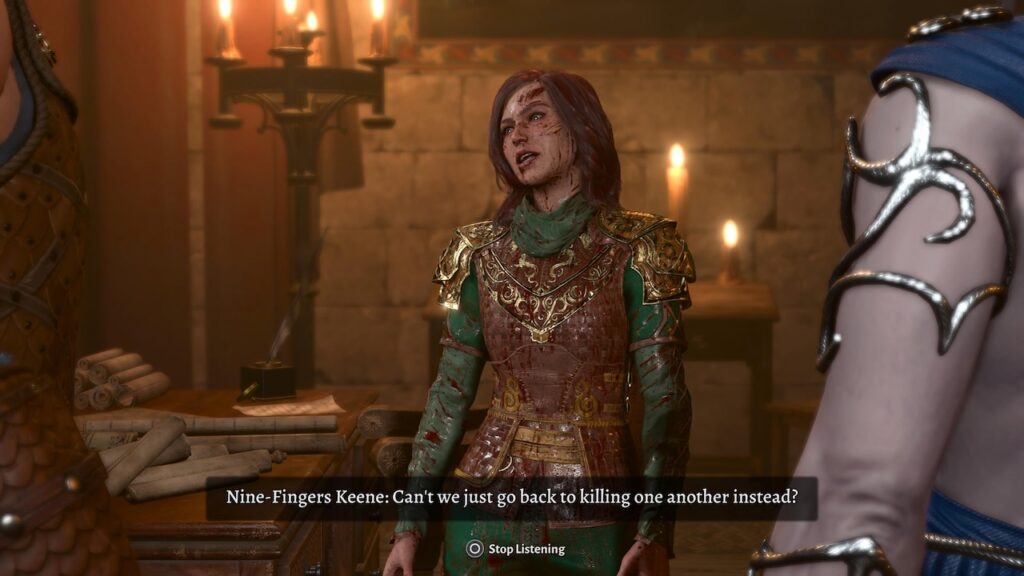
Each of the Companions has a character arc that you can dramatically affect by your story decisions, conversations, advice, etc, much like real life. For the most part, it seems like there are two ‘paths’ that they can end up going, although I haven’t played enough to find out if there are more. Many of these characters were so annoying that, for the first half of the game, I considered sacrificing them if the story called for it. But by the end of the game, I had gone on such a journey with them that I was genuinely happy to give them a hug.
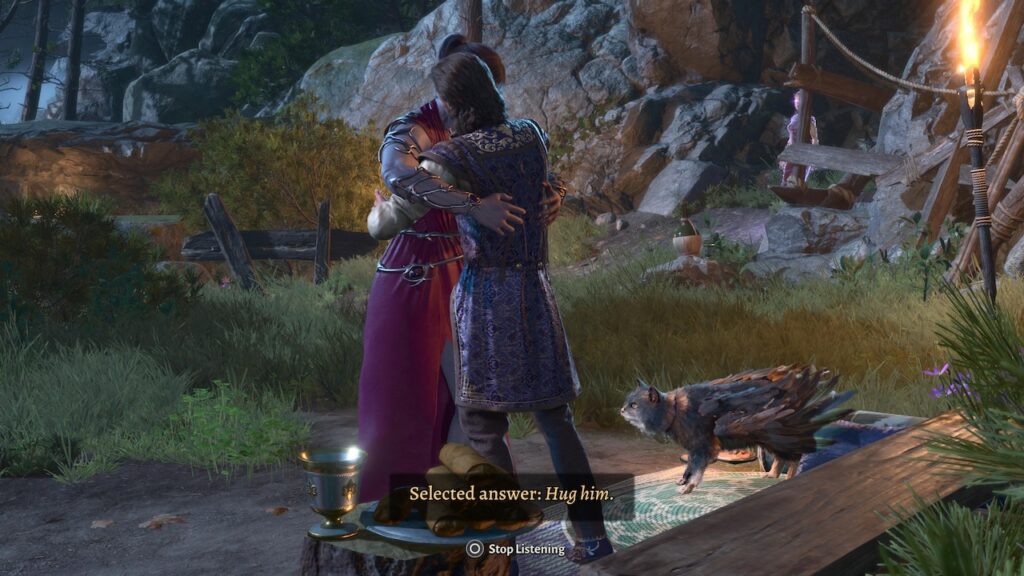
I have mentioned my long-time love of the Mass Effect series, and I do definitely still love it, but it’s the best comparison I have for this game. In Mass Effect, your companions also grow with you and you can change how they turn out (”hardening” Garrus or keeping him believing in the good of the universe, keeping the krogan isolationist and aggressive vs learning to gently headbutt the rest of the universe’s species), but not nearly to the extent that you can in BG3. Each one has a sliding scale of how they may turn out, and while no one can say what the best ending is—because everyone has different priorities—I did stumble upon what many would consider the ‘ideal’ ending. Some of this may have been with Bill’s guidance and advice, but we were also pretty careful in making sure that I made my own decisions, so I feel pretty good that I got that on my first run.
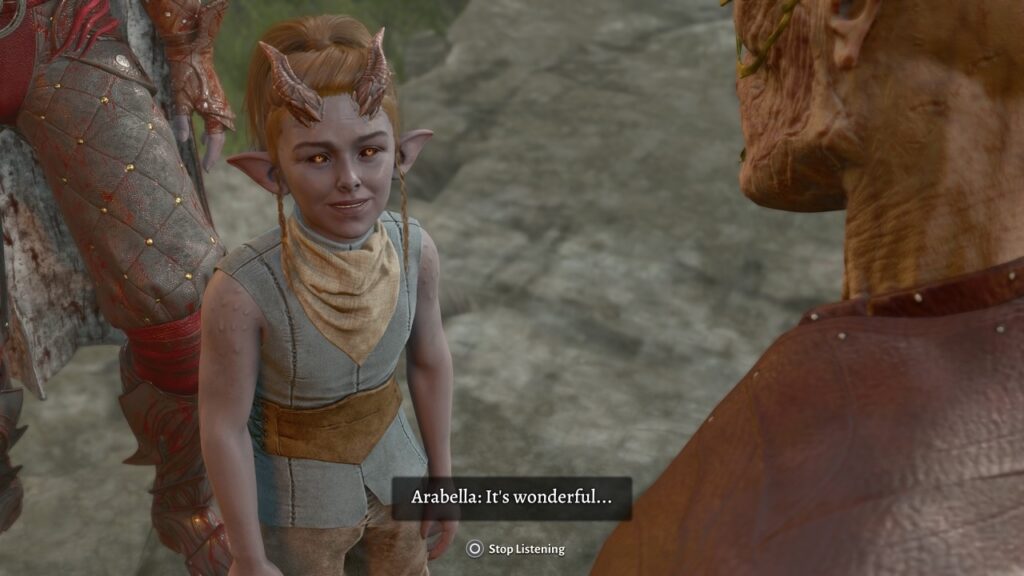
The game boasts something like 17,000 different endings, and although most of those are going to be small changes (did this side character survive, what happened to this egg that you stole, does your companion continue their zealous devotion or start doing their own free thinking, who is now the person in charge of Castle Fancypants, etc), there are enough nuances in the game that people replay it over and over to see what happens and how different romances can develop (ahem).
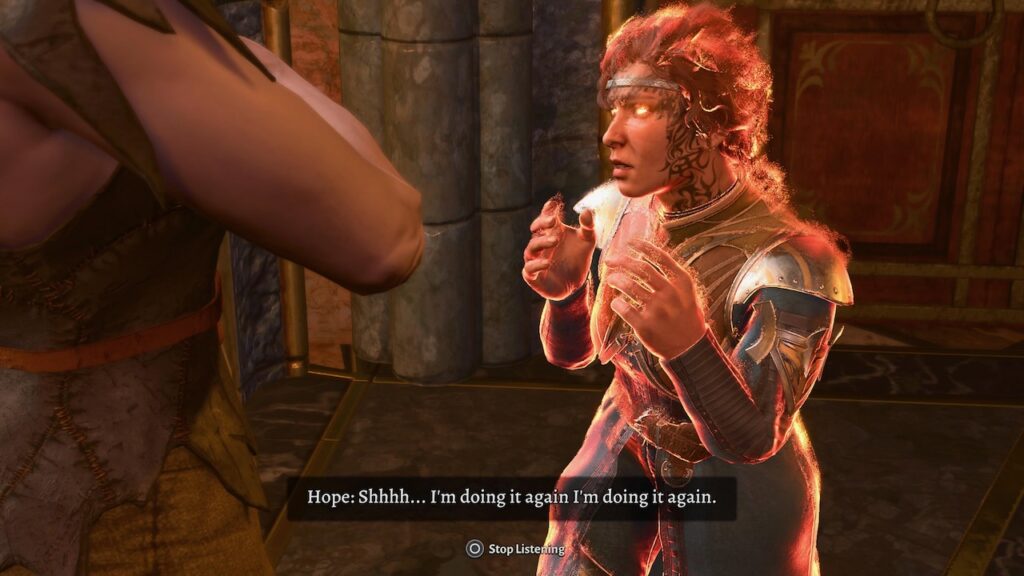
In short, BG3 is a very long dating sim with the main theme of “BUT I CAN CHANGE THEM!”
Speaking of Romance!
There are a total of 9 people that you can romance in the game (in terms of relationships. There are many more you can have sex with) but my heart immediately and irresistibly fell for Karlach. How could I not? She’s adorable, open, passionate, protects kids and animals, swears like a foul-mouthed pirate, and lives life to the absolute f*cking fullest. If I met her in real life, I would definitely try to awkwardly flirt with her and stammer something about how I love her spark.
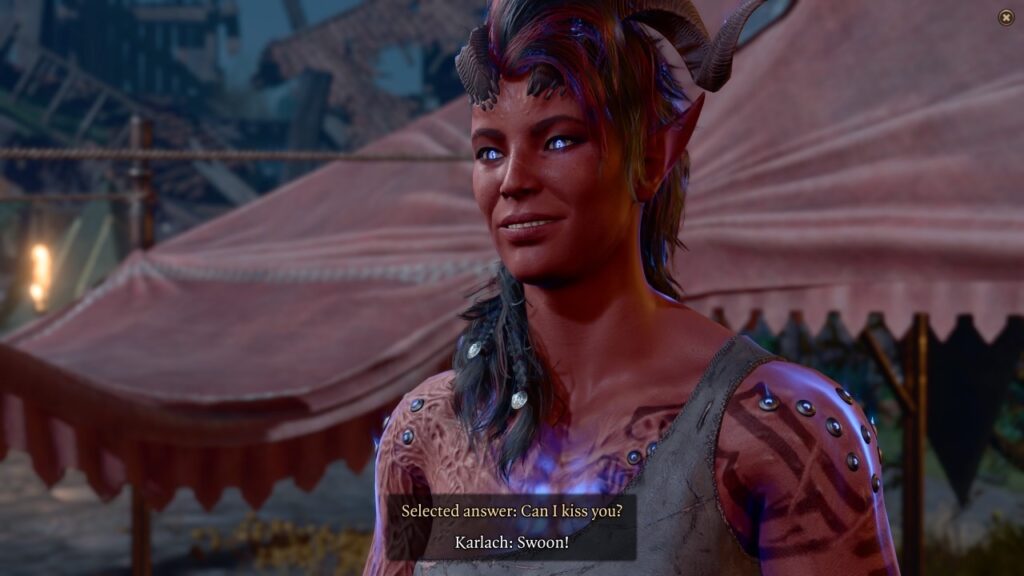
A relationship with her seemed to develop more from friendship, which is how I prefer relationships anyway, and she plays no games — she is up front about her interest, open about what she is looking for, and easily says that she loves my character. And she gives forehead boops!
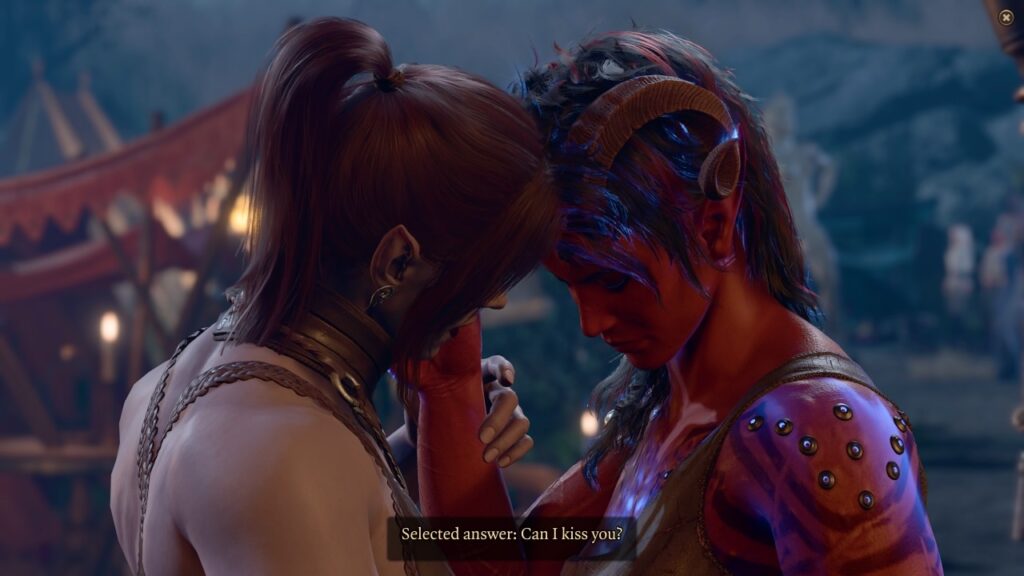
I was happy with how the game was going, having landed my beautiful barbarian darling. We raged against the world and beat people up together. We petted the camp pets and helped vulnerable puppies and kids. I thought I had completed my playthrough romance objective, and I was content.
Then, oh heart of hearts, the game also offered me a relationship with Halsin, the sweet-hearted bear of a man that was unerringly supportive, open about his feelings, had arms like tree trunks, and could wild shape into a dinosaur.
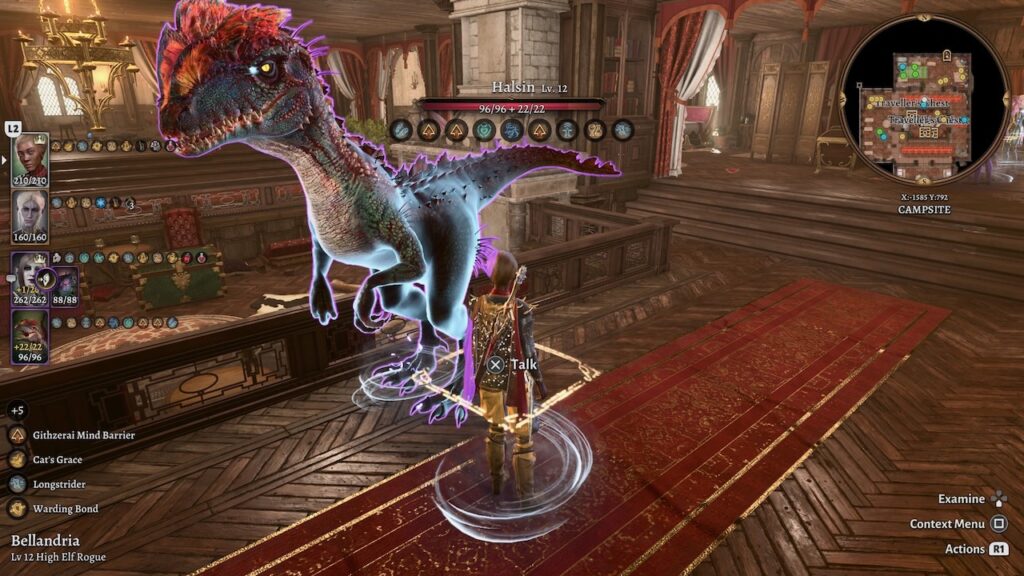
The game wins extra points from me by having poly options! Not every character will agree to it, which seems even more realistic to me. When Halsin confessed his feelings for my character, he explained his ENM belief structure, and then told her that he would need to know Karlach was okay with it before anything could happen.
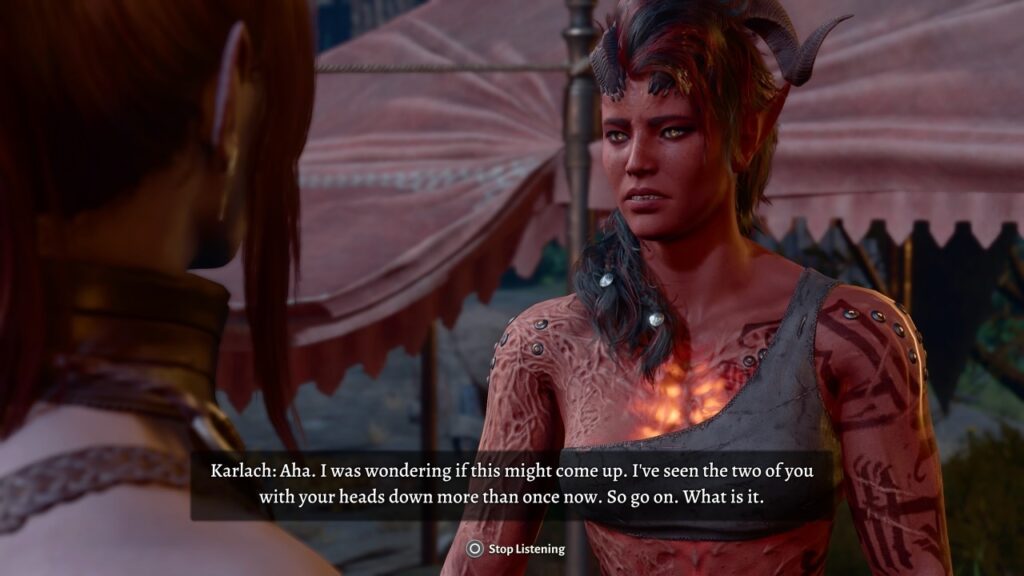
Now I had TWO absolute darlings at camp, and an owlbear cub, AND a doggo. What was even the point of another playthrough? I’d already achieved perfection.
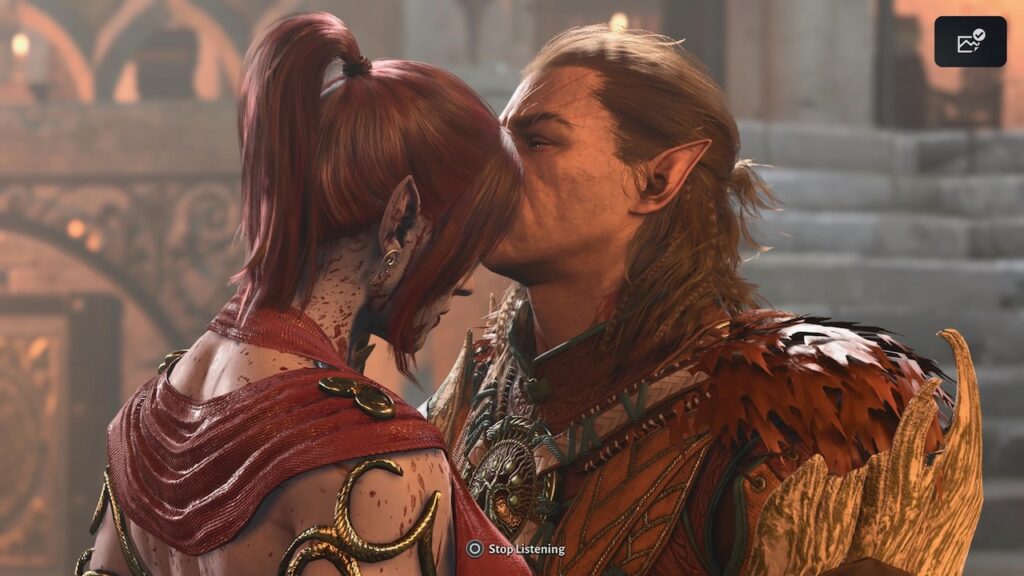
Wrap Up
Ultimately, despite the fact that 1/14 gave me the “best” ending, the reason I started a second playthrough already is to see how I can affect other choices going forward. I’ve romanced Karlach and Halsin here, but what about the enigmatic Shadowheart? Do I try to turn her away from her religious fervor and toward the literal light, or accept her as she is and push her toward a darker path? What kind of character would I play that would match well with that? How does Wyll change if he is romanced, given that his outlook on life is already pretty romantic? What happens if I play a character that is completely against love in general? What happens if I use the giant solar-powered fireball on the building while my teammates are still in it? What happens if I side with the “viva la resistance!” faction instead of the “give peace a chance” faction? So many permutations. So many options and details in this game.
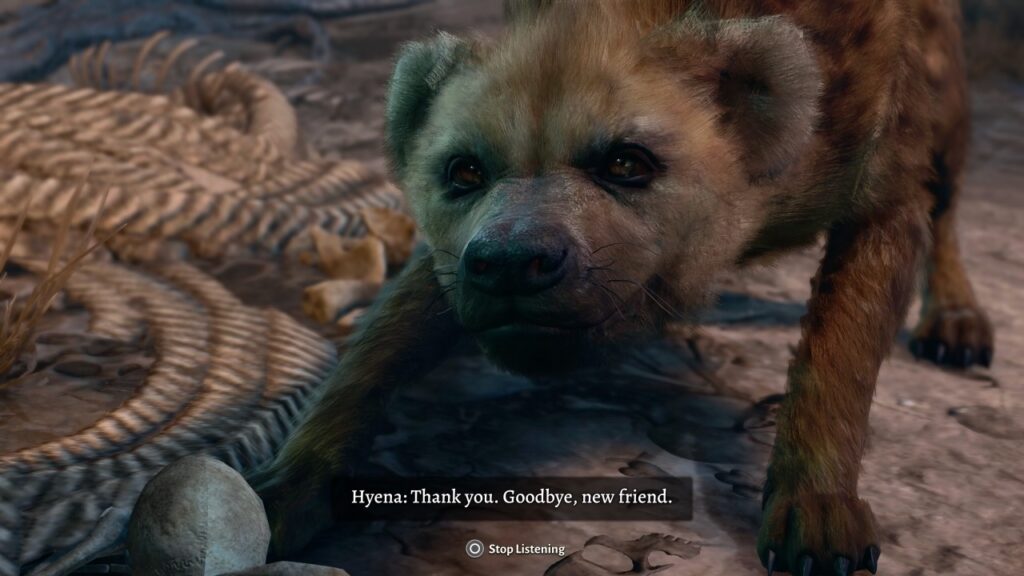
I don’t think it is hyperbole to say that this game has changed my life. I have already gotten my poly partners to play this game, as well as a couple of other friends. I am currently in my second playthrough, and have plans for a couple more. I’m researching different builds for character types that I’ll want to try out. My “yes/no” decisions on social events basically gets compared to “would I rather stay at home and play BG3?” At some point, this hyperfixation will likely die down, but for now, I’m genuinely enjoying feeling this passionate about a game again.
Which means that this wouldn’t have happened if I didn’t have a Bill to gently push me toward playing it! Given that he’s been worried that he spoiled my first playthrough by guiding me through the new exploration part, I think it gets balanced out by the fact that I’m willing to keep going on my own and keep exploring anyway. This might not have happened if I didn’t enjoy this game so much my first time through, so, Bill:
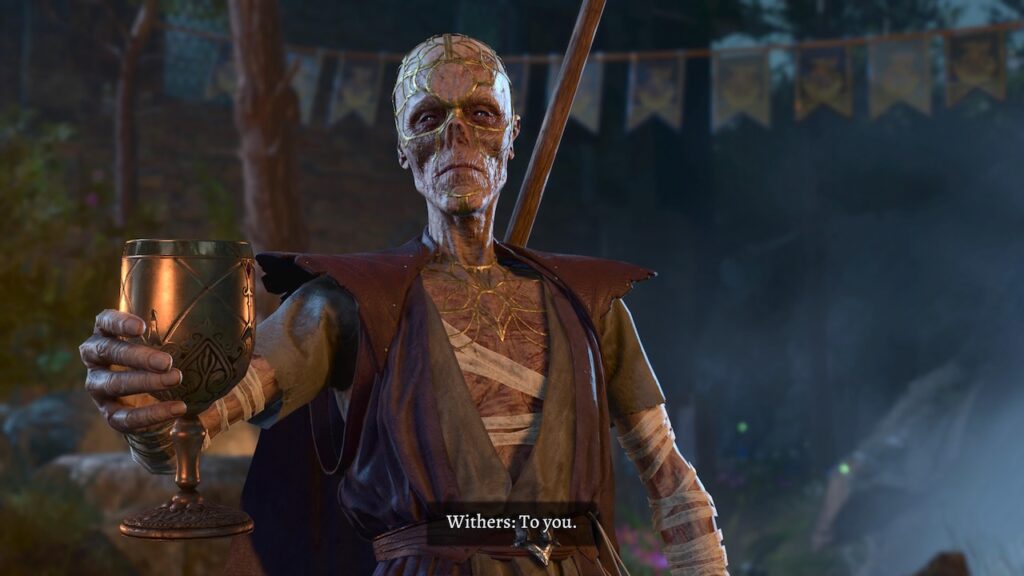
Pingback: Baldur’s Gate 3 – Playthrough 2/14.5 – Raelia and Tavelle – The Argothald Journal
Pingback: Preserving BG3 game saves made on PS5 – The Argothald Journal
Pingback: BG3 – Summoned creatures, throwing potions, and consoles – The Argothald Journal
Pingback: Baldur’s Gate 3 – Playthrough 8’/2.5 – Druid Angela and Mor’lith – The Argothald Journal
Pingback: Baldur’s Gate 3 – Playthrough 3’ – Tav and Trophies – The Argothald Journal
Pingback: Real Angela’s playthrough 6 – Light Urge Persephone – The Argothald Journal